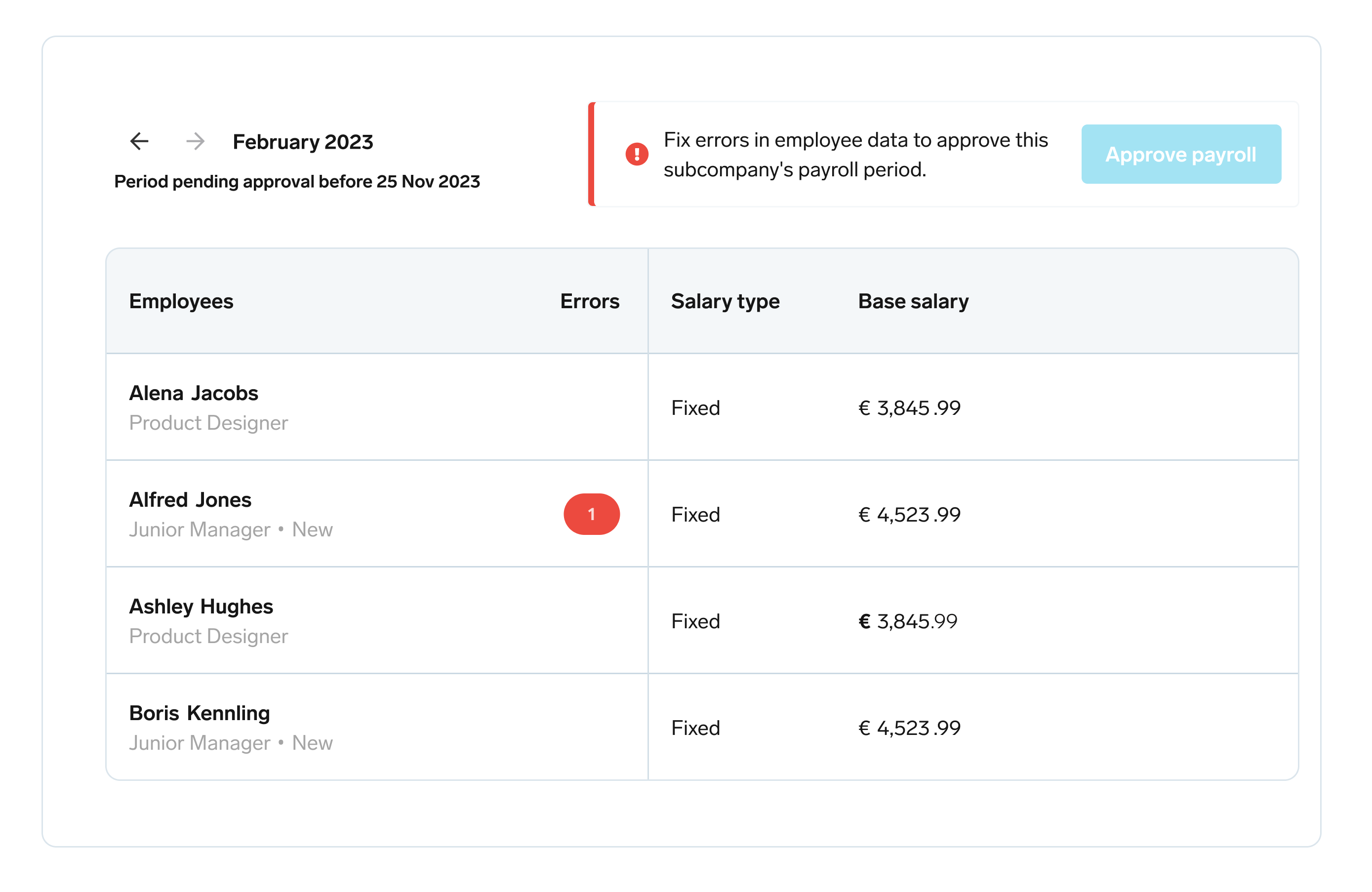
Start simplifying your payroll management
Learn how to streamline your payroll process to save time and ensure accuracy.
Read our guideLong-Term Sick Pay and Universal Credit: Questions Answered
Going on long-term sick leave can be a stressful time for an employee. Not only do they have their health to worry about, they’ll likely experience a drop in income too. Employees on sick leave who need help with their living costs can apply for Universal Credit, a benefit designed to help working-age people on low incomes in the UK.
Employees can apply for Universal Credit even if they’re already receiving long-term sick pay, although the amount they receive depends on how much you’re paying them. In this article, we’ll discuss how long-term sick pay and Universal Credit work together, so that you’re better equipped to support your employees through difficult times.
Here's how you can use Personio's HR software to create various absence types.What Is Universal Credit?
Universal Credit is a payment for low-income-earners in the UK who are over 18 but under State Pension age. It was introduced in 2013 to replace a number of different benefits for people of working age. Universal Credit is different from other benefits because you can get it even if you’re working, as long as your income is below a certain amount. This means that if you’re an employer, some of your employees may be claiming Universal Credit.
Universal Credit payments are usually made every month. The payment is made up of a basic allowance plus additional amounts for things like housing costs, caring for children or sickness and disability. The amount someone receives can also change from month to month based on changes in their circumstances. For example, if they get a job or start earning more money, their payments will be reduced.
What Benefits Has Universal Credit Replaced?
Universal Credit was brought in to consolidate six different benefits and tax credits under one system. The benefits it replaces are:
Child Tax Credit
Housing Benefit
Income Support
Income-based Jobseeker’s Allowance (JSA)
Income-related Employment and Support Allowance (ESA)
Working Tax Credit
Universal Credit has already replaced these benefits and tax credits for most people, though some people are yet to be moved onto Universal Credit.
Who Is Eligible for Universal Credit?
Universal Credit is designed for people on low incomes who need help with their living costs. This includes people who are out of work, employed and self-employed. It also includes those who are unable to work, for example because of a health condition.
To get Universal Credit, you usually need to:
Be 18 years old or over (although some 16 and 17-year-olds are eligible)
Be under State Pension age
Live in the UK
Have less than £16,000 in capital (savings or other investments)
Capital doesn’t include the home the claimant lives in or their pension pot. If they live with a partner, their partner’s income and capital will be taken into account when the claim is assessed.
Can An Employee Claim Universal Credit If They’re On Long-Term Sick Leave?
The short answer: yes. Universal Credit is available to anyone on a low income, regardless of whether they’re employed. So, if someone is on long-term sick leave and not receiving their normal salary, they may be able to get Universal Credit even if they normally earn too much to qualify.
Review, approve and track absences from one place: Personio

Seamless absence management that scales with your headcount. See how Personio can manage every type of leave for your organisation today.
Absences with PersonioUniversal Credit and Long-Term Sick Pay: How It Works
Long-term sick pay is money that an organisation pays to an employee who is on long-term sick leave. Generally speaking, this means that the employee is off work for at least four weeks. Companies are free to choose exactly how much sick pay they pay their employees (and how long they pay it for), as long as it’s at least equal to statutory sick pay (SSP).
Under Statutory Sick Pay, employees are entitled to £99.35 per week for up to 28 weeks, as long as they meet certain conditions. This can help employees on sick leave to manage their expenses. However, it’s still significantly less than a full-time employee would make in a week, even on minimum wage. Because of this, employees receiving statutory sick pay may be able to claim Universal Credit to help them with their living costs while they’re not able to work.
Long-Term Sick Pay and Universal Credit: Example
Imagine an employee goes on long-term sick leave, and you decide to pay them the statutory minimum sick pay, which is £99.35 per week. Because this is less than they were earning before, the employee starts looking into what extra financial support they might be entitled to.
Under Universal Credit, some people are entitled to a monthly work allowance, which is the amount they can earn without it affecting their claim. This includes people who have a disability or health condition that affects their ability to work — like our example employee.
SSP payments come out at around £430 per month. This is less than the monthly work allowance of £573, so this employee would be able to claim Universal Credit. However, they would have to go through a Work Capability Assessment to determine how much their condition impacts their ability to work.
The exact amount the employee receives will also depend on other circumstances, like whether they have dependent children or relatives to care for. Since the employee is suffering from an illness of some kind, it’s likely that they’ll also receive an additional monthly amount to help them with this.
What About When Long-Term Sick Pay Stops?
The good thing about Universal Credit is that the amount a person receives can change from month to month depending on their circumstances. This means that if they stop receiving sick pay, their Universal Credit might increase to make up the difference. Equally, if the employee goes back to work and their income increases, they will stop receiving Universal Credit.
What Does Universal Credit Mean for HR and Employers?
Because Universal Credit provides support for people who are in work as well as those who are unable to work, it can impact employers in a number of ways.
First, HR or payroll departments must take special care to file accurate and timely PAYE information to HMRC for any employees on Universal Credit. This is because this information will be forwarded to the Department for Work and Pensions (DWP) and taken into account when calculating the employee’s next Universal Credit payment. Any mistakes could mean they miss out on a payment or don’t get paid on time.
Universal Credit also provides certain advantages to employers. For example:
A more flexible workforce: Because payments can vary depending on the claimant’s circumstances each month, it’s easier for them to take temporary jobs or vary the number of hours they work each week without worrying about how it will affect their Universal Credit.
No more 16-hour rule: Under previous benefits systems, claimants would lose access to their payments if they worked more than 16 hours per week on average. However, Universal Credit is based solely on income, regardless of the number of hours someone works. This means that employees may be more likely to take on extra hours during busy periods when you need them since they won’t automatically lose their benefits.
More diverse candidates for entry-level roles: Universal Credit can support young people as they take the first steps in their careers by topping up a low salary. It might also encourage a more diverse range of candidates to apply for these entry-level roles since they know they’ll be supported. This makes it easier for older people to start new careers, and means employers could benefit from people with skills and experience, even in entry-level positions.
Manage Absences Easily With Personio
Every good employer wants to support their employees through periods of illness and absence — but managing this across a whole organisation can be a challenge.
With Personio’s absence management features, HR teams can get access to a clear and simple calendar that shows them who’s out sick, who’s on leave and who’s available to work.
Even better, Personio could help HR to spot problems that might be leading to absenteeism ahead of time through People Workflow Automation reporting, which can help you to identify teams or departments where illness, stress or discontent is brewing.
Want to learn more about Personio? Book a demo to see it in action.
